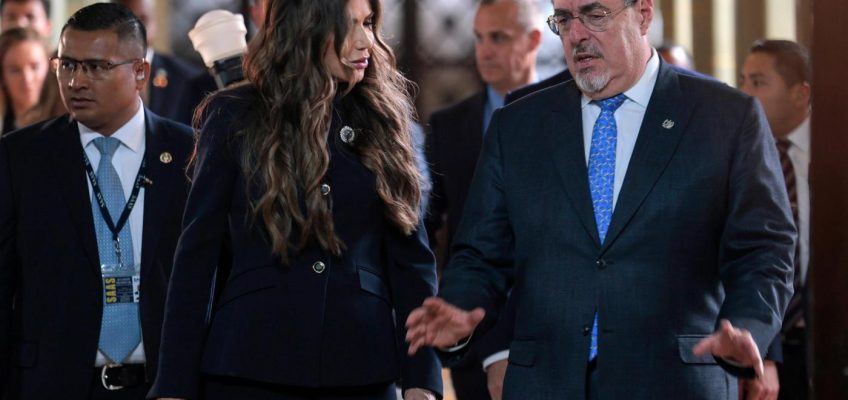By REBECCA SANTANA and CHRISTOPHER SHERMAN
GUATEMALA CITY (AP) — Guatemala and Honduras have signed agreements with the United States to potentially offer refuge to people from other countries who otherwise would seek asylum in the United States, U.S. Homeland Security Secretary Kristi Noem said Thursday at the conclusion of her Central America trip.
Related Articles
How carbon capture works and the debate about whether it’s a future climate solution
Former top aide to Jill Biden is subpoenaed by House Oversight panel
Trump administration expands military’s role at the border to the southern tip of Texas
NYC Mayor Eric Adams kicks off reelection bid and casts Mamdani as having a ‘silver spoon’
‘A purpose in this world’: Older adults fear elimination of program that helps them find work
The agreements expand the Trump administration’s efforts to provide the U.S. government flexibility in returning migrants not only to their own countries, but also to third countries as it attempts to ramp up deportations.
Noem described it as a way to offer asylum-seekers options other than coming to the United States. She said the agreements had been in the works for months, with the U.S. government applying pressure on Honduras and Guatemala to get them done.
“Honduras and now Guatemala after today will be countries that will take those individuals and give them refugee status as well,” Noem said. “We’ve never believed that the United States should be the only option, that the guarantee for a refugee is that they go somewhere to be safe and to be protected from whatever threat they face in their country. It doesn’t necessarily have to be the United States.”
During U.S. President Donald Trump’s first term, the U.S. signed such accords called safe-third country agreements with Honduras, El Salvador and Guatemala. They effectively allowed the U.S. to declare some asylum seekers ineligible to apply for U.S. protection and permitted the U.S. government to send them to those countries deemed “safe.”
The U.S. has had such an agreement with Canada since 2002.
The practical challenge was that all three Central American countries at the time were seeing large numbers of their own citizens head to the U.S. to escape violence and a lack of economic opportunity. They also had extremely under-resourced asylum systems.
In February, U.S. Secretary of State Marco Rubio signed deals with El Salvador and Guatemala that allowed the U.S. to send migrants from other nations there. But in Guatemala’s case it was to only be a point of transit for migrants who would then return to their homelands, not to apply for asylum there. And in El Salvador, it was broader, allowing the U.S. to send migrants to be imprisoned there.
Mexico President Claudia Sheinbaum said Tuesday that Mexico would not sign a third safe country agreement, but at the same time Mexico has accepted more than 5,000 migrants from other countries deported from the U.S. since Trump took office. She said Mexico accepted them for humanitarian reasons and helped them return to their home countries.
The U.S. also has agreements with Panama and Costa Rica to take migrants from other countries though so far the numbers sent have been relatively small. The Trump administration sent 299 to Panama in February and fewer than 200 to Costa Rica.
The agreements give U.S. authorities options, especially for migrants from countries where it is not easy for the U.S. to return them directly.
Sherman reported from Mexico City.


Leave a Reply